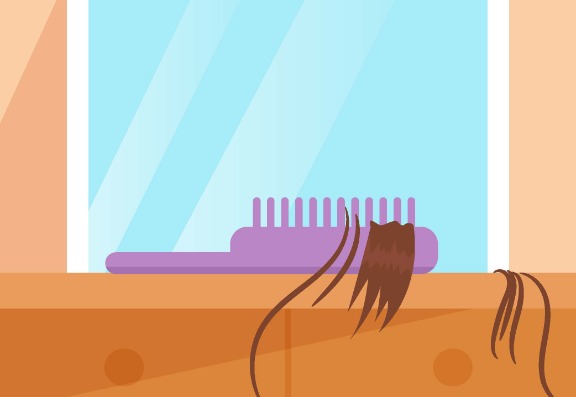In our previous blog, we looked at identifying hair loss and some initial considerations to make. In this blog, we focus our attention on achieving a hair loss diagnosis in women.
Although there are many shared diagnoses affecting both men and women, there are other factors that can cause male hair loss, so we explore it in a separate male hair loss blog.
What is causing my hair loss?
Establishing the correct cause of hair loss is important as this will determine which treatment options are available. Hair loss can occur as an isolated health problem or may occur as a symptom of an underlying medical condition. Answering the following questions can help differentiate the two:
Answering yes to any of these questions could warrant a visit to the general practitioner where further investigations and blood tests may be performed to reach a diagnosis. Resolving any underlying health problems or stopping the medication may actually be enough to reverse the hair loss process.
Common medical conditions associated with hair loss in women include:
I am confident that my hair loss is an isolated problem
If this is the case, it’s time to explore the nature of the hair loss itself. At the end of our last blog we asked the following questions:

What are the most common causes of isolated hair loss in women?
Late female pattern baldness (androgenic alopecia): Hair loss in females, similar to males, is in part driven by testosterone.
Although not as common as male pattern baldness, this condition also affects many women and it is caused as a result of both genetics and hormones.
Women can inherit different genes which make their hair more prone to a process in which hair follicles shrink from thick healthy hairs to thin friable hairs. This is known as miniaturisation.
The actual process is driven by the hormone testosterone particularly when a woman goes through menopause and her hormone levels change drastically.
The process can also happen earlier in a female’s life (called early female pattern baldness) and this is often due to an underlying condition like Polycystic Ovary Syndrome where the levels of testosterone are higher in the body.
In most cases of female pattern baldness (early or late), this results in diffuse thinning on the top of the head and crown.
Often the frontal hairline, the back and the sides of the head are preserved in this process as the hair follicles are not as sensitive to the hormone changes.
This results in a diffuse central pattern of hair loss commonly associated with this condition.

Acute/chronic telogen effluvium: In our first blog we discussed stages of the hair growth cycle.
In this condition, a sudden change in our physical or psychological health drives hair follicles into the telogen phase.
This results in more hairs falling out than growing and gives rise to generalised hair loss over the entire scalp with no specific pattern.
In the acute form of the condition, this shedding occurs over six months and often resolves on its own. However, if the hair loss is sustained this is described as chronic telogen effluvium.
During pregnancy, the hormonal balance of an expecting mother is protective against hair loss. However, after pregnancy, the sudden hormonal shift causes acute telogen effluvium.
This hormonal shift similarly causes hair loss associated with taking certain types of oral contraceptive pills. Given a few months after pregnancy, these hairs will re-grow as they re-enter the growth phase of their cycle.
Alopecia areata: Patients develop small patches in their hair which occurs as a result of the body’s immune system overreacting to its own hair follicles. They then become thin, discoloured and fall out.
After some time, these hairs will often grow back without the need for treatment. In rare cases, the hair loss may develop into a loss of all scalp hair (alopecia totalis) or the entire body (alopecia Universalis).
Lichen planopilaris: This presents with an intensely itchy and red scalp mainly affecting the crown and top of the head. The condition involves inflammation around the hair follicle causing patchy hair loss.
After hair is lost the scarring of the skin makes this condition very difficult to treat.
Frontal fibrosing alopecia: This condition largely effects postmenopausal women.
It is thought to be a form of lichen planopilaris, although this is not clear.
However, in a similar way to lichen planopilaris it causes scarring hair loss focussed in band-like fashion across the frontal hairline.
Therefore, it may appear similar to frontal recession observed in some variations of female pattern baldness. This must not be confused as management strategies are entirely different.

Central centrifugal cicatrical (hot comb) alopecia: This condition predominantly affects adult black women. Hair loss often starts in the middle of the central scalp and with time spreads out in a spiral fashion around this area.
Traction alopecia: Various grooming styles such as hair extensions, braids, cornrows, weaves and ponytails can place extensive tension on the hair.
With time this can damage hair making them thin and wispy. If this is sustained over a long period of time this can result in long term hair loss in the area where tension is placed on the scalp.
Trichotillomania (compulsive hair-pulling): In this condition, patients suffer from patchy hair loss as a result of repeated habitual hair pulling. This is often associated with psychological stress.

What else could cause my hair loss?
Stress, diet and other lifestyle factors can contribute to problems with hair loss.
They can directly influence hair conditions resulting in hair breakage worsening any existing hair loss.
They can also work indirectly to make underlying hair conditions more severe or accelerated.
It is, therefore, doubly beneficial to ensure lifestyle factors for hair loss are appropriately managed.
If you want to read more, the experts at Consulting Room really know what they're talking about and have put together non-surgical hair loss, hair transplant, hair loss drugs and Hair loss FAQs just for you.
If you have more questions, you can use the non-surgical hair loss, hair transplant, hair loss drugs and Hair loss questions feature to talk to our panel of trained medical experts.
If you're keen to get started with any of these treatments right away then you're in luck - those clever folks also have a list of trusted, accredited non-surgical hair loss, hair transplant, hair loss drugs and Hair loss clinics in your area.
Many thanks to the author Dr Dilan Fernando who is the lead hair transplant surgeon at The Treatment Rooms London, he has seen first-hand the life-changing results surgery can have.
Undergoing the procedure is a highly personalised choice and Dr Fernando goes the extra mile to ensure high-quality natural hair growth results that account for the future.

Find out all the different Hair Restoration treatments available so you don’t have to suffer from Alopecia alone!
Hey, wait!
Before you go.....
Let's stay in touch, pop your details here and we'll send our editor's hand-picked updates on your fave subjects.